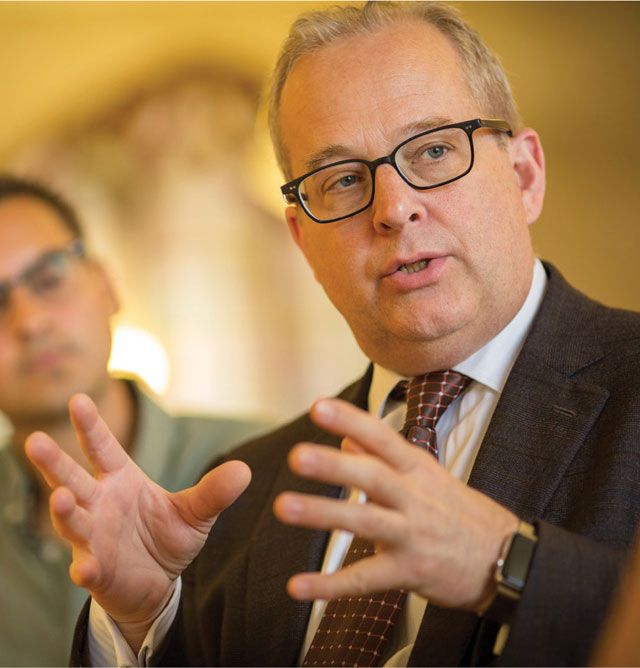This issue arrives at an exciting time for the Rossin College and for our University as a whole. Within engineering, the faculty is leading an envisioning process that will articulate specific, actionable plans to move our College forward. Discussion focuses on these areas―innovating our learning environments, enhancing our research impact, and developing areas of distinctive intellectual prominence for our future. There will be more to come as this process builds momentum, so please stay tuned.
Along the way, it has been crystal clear that Lehigh's interdisciplinary science and engineering research culture―the hallmark of our overall academic environment―serves as a powerful foundation for our future. In short, the most interesting, challenging, and pressing issues of our time require thinkers who are perfectly comfortable working outside of their comfort zones.
This issue of Resolve celebrates what can happen when teams of researchers, with varied expertise, integrate their skills and expand the boundaries of their traditional fields. Throughout, you will notice faculty researchers with related yet asymmetrical interests working together to find success.
The article "Advancing Materials for Health" features Lehigh research in an area of key importance to broader societal concerns in health and healthcare. Recent estimates have projected that the global biomaterials market will more than double by 2021, reaching nearly $150 billion. From a research perspective, it’s a field situated squarely at an intersection of disciplines where Lehigh enjoys significant, demonstrable strength.
The "Q&A" interview with Lehigh chemical engineering alumnus and Trustee Dr. Michael Yaszemski '77 '78G is a strong reflection of how research in biomaterials, and biomedicine more broadly, can make a lasting impact.
"Stronger Soil through Bioengineering" discusses research that uses an enzyme, inspired by sea sponges, to develop stronger substructures and increase earthquake resistance: another strange-but-true product of interdisciplinary science.
The "Rising Star" in this issue, Dr. Brandon Krick, is a one-person interdisciplinary research machine. Relatively new to Lehigh, Brandon is already leveraging his expertise in tribology―the science of 'wearing and tearing'―in fascinating ways, contributing to a number of successful research projects with colleagues at Lehigh, and elsewhere.
To support such endeavors, we must continue to develop strong core facilities that enable groundbreaking research, coupled with shared spaces that encourage interdisciplinary interaction. These facilitate collaboration that leads Lehigh, as an institution, in exciting new directions.
The feature article "Bringing Fusion into Focus" shows how sophisticated instrumentation, mixed with ingenuity, is key to unlocking new engineering knowledge and technical advancement in important fields--while creating cutting-edge learning opportunities for our students.
The "Educational Innovation" article highlights our work with KEEN, the Kern Entrepreneurial Engineering Network. While Lehigh is renowned for its thriving set of entrepreneurship education programs, the KEEN team’s focus is different―a broad effort to fundamentally transform the undergraduate curriculum across all engineering majors. The goal is to instill in all Rossin students an entrepreneurial mindset that empowers them to identify opportunities and make an impact.
With support from KEEN, we are developing novel curriculum design techniques that get students thinking creatively about every aspect of projects they encounter, while adhering to the rigor of a classic Lehigh Engineering education. As you'll see, KEEN is helping to change the way everyone from senior faculty to incoming first-year students view the role of the modern engineer.
I hope you enjoy this issue of Resolve. Thanks for supporting the Rossin College; please drop me a line with your thoughts and comments.

Stephen P. DeWeerth, Professor and Dean
P.C. Rossin College of Engineering and Applied Science
steve.deweerth@lehigh.edu

